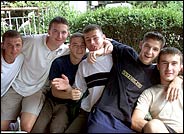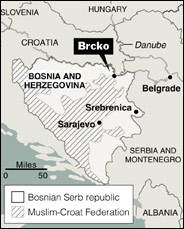

 |
| Danilo Krstanovic/Reuters, for The New York Times |
| Marko Jurocivic, a Bosnian Serb, right, and his Muslim friend Mirsad Mujdanovic, third from left, with other youths outside the high school in Brcko that was integrated on the order of the city's American administrator. |
 |
| The New York Times |
| Brcko, once a 'snake pit,' is now booming, with little ethnic tension. |
BRCKO, Bosnia and Herzegovina, June 13 — A decade ago, Samira Hasanvasic said, her parents huddled in a nearby village as Bosnian Serbs hunted down Muslims, torching their houses and driving many into exile. Others they killed, dumping the bodies into the muddy shallows of the Sava River.
This week, Ms. Hasanvasic, 17, completed her second year in a high school that integrates Muslims, Serbs and Croats — children of the groups that fought so bitterly over the right to live apart. It is the only city in Bosnia where the three main ethnic groups are mandated to go to school together.
"At first, everyone was afraid because of what happened during the war," said Ms. Hasanvasic, gesturing to her friend, Romana Stjepic, a Croat. "But then we got to know each other, and the fear went away."
Ms. Hasanvasic still dreams of leaving her hometown behind, but not because it was a killing ground. For her, Brcko (pronounced BIRCH-ko) is just run-of-the-mill boring.
Brcko's transition from deadly to merely dull is a remarkable success story — one of the few in the years that foreigners have been trying to fix this broken land, and one that offers lessons for the United States as it embarks on its latest effort at nation-building in Iraq.
"This was a snake pit, the worst place you could imagine in Bosnia," said Mark Wheeler, director of the Bosnia Project at the International Crisis Group, a research group. "But the international community equipped people with enough authority to get their jobs done."
Today, this river port of 85,000 on the northeastern border of Bosnia has the highest per capita income in the country, a balanced budget and a skyline alive with construction cranes. Ethnic tensions, while not gone, seem to have been relegated to the status of a distraction for which the busy people have no time.
Some of Brcko's success is due to money. Treated as an international protectorate since the war, it has received $2 million a year in direct American aid, plus an estimated $65 million in other foreign aid.
Yet dollars alone do not explain the rebound. Bosnia as a whole has been flooded with anywhere from $5 billion to $15 billion — more precise estimates are hard to come by — and it still languishes.
The lesson of Brkco, Mr. Wheeler said, is that would-be nation-builders should install a powerful interim administrator, who is unafraid of defying the local political bosses. With a whip and some cash in hand, this proconsul can override ethnic loyalties and turn local attention to establishing the rule of law and business-friendly policies.
Henry L. Clarke, an American diplomat who became Brcko's third supervisor in April 2001, turned the tide. He has imposed one law — on integrating the schools — over the objections of the city council. He has annulled two others, dismissed local officials and business chiefs, and rammed through reforms.
"The powers are broad, I won't deny that," Mr. Clarke said over dinner. "But the way you get reforms done is with the cooperation of the people. You don't get it by acting like a little Tito."
As for elections — a perennial concern of American officials — they have simply not taken place for local posts here. The people of Brcko have voted, largely along ethnic lines, in the four national elections that have been held in Bosnia since 1996. But they have not elected a single city official; instead, the supervisor appoints the city council.
"Thankfully it didn't happen," Senad Pecanin, editor of the weekly magazine Dani, said of local elections.
"The worst mistake we made in Bosnia was insisting on early elections," he said. "They just confirmed the results of the war in political terms."
Brcko's progress has been so good that Paddy Ashdown, a British politician who last year became the latest European to take on the office of high representative of the international community, said, "I looked at Brcko and thought, `That's what we ought to be doing,' and I used my powers in a similar fashion."
Bosnia as a whole, however, remains a ruin. Dragged down by old Communist structures and largely destroyed by the war, the economy suffers from mountainous deficit. Elections entrenched corrupt leaders, who stymied economic reforms.
Ironically, Brcko has avoided that general fate precisely because it was so disputed between Muslims, Serbs and Croats that its fate could not be decided at peace talks in 1995.
Finally, an international tribunal ruled that Brcko would be run as a separate district, with an appointed local government and an outside American supervisor who would be fortified with broad powers.
"The U.S. reaction was: `Oops, we just took on one of the blackest holes in Bosnia. We can't let this fail,' " Mr. Clarke said.
The colony they took over was a shambles. More than 9,000 houses, a third of the total housing stock, had been destroyed during and after the war. The town's port was moribund, its food-processing plants were rusting hulks, and land mines lurked in the surrounding fields.
Perhaps because of his mild manner, Mr. Clarke has stirred little open resentment in Brcko. The Serbian mayor, Sinisa Kisic, describes him as an "adviser rather than one who orders." Only when he forcibly integrated the schools did he provoke a backlash among Serbs, some of whom dubbed the decision "Clarke's Law." Even then, they put up no violent resistance.
Mr. Clarke's latest project is the Arizona Market, a collection of sprawling, seedy stalls on the edge of town. When Arizona first sprouted after the peace accord was signed, it was hailed as hopeful because Serbs, Muslims and Croats met there for trade and business deals that had ceased during the war.
But now Brcko's city council has given control of the land to an Italian developer, who is investing more than $100 million to turn Arizona into a modern shopping center.
Critics have a cynical take on Mr. Clarke's activism: that he keeps inventing new jobs to avoid leaving. "The Americans don't want elections because they're afraid the bad guys will win," Mr. Wheeler said.
Mirsad Djapo, a local Muslim leader, noted that in the last national election, Brcko's citizens voted for the Serbian nationalist party in greater numbers than Serbs nationally. "We must have elections, but there is always a risk," he said.
And Brcko remains awash in guns. American soldiers go door to door these days, selling raffle tickets for the chance to win a
Mr. Clarke said he would not be rushed into packing his bags. But he agrees in principle with Mr. Wheeler's suggestion that Brcko hold elections in October 2004 to coincide with local elections throughout Bosnia.
The debate over democracy stirs little interest among young people here. When Brcko devised a new curriculum for its schools, it scaled back history in favor of subjects like mathematics and computers.
"We're young, and we don't know anything about the war," said Marko Jurocivic, a 17-year-old Serb. "Our history class ends with World War II."